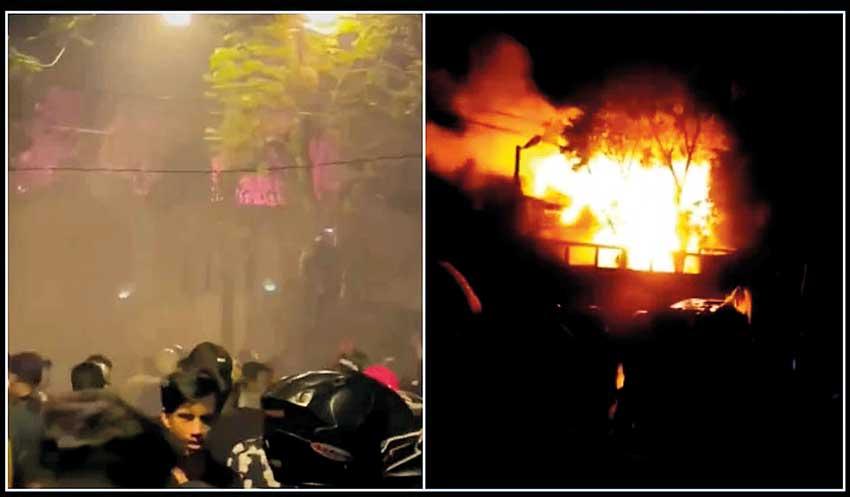Reply To:
Name - Reply Comment

Former Prime Minister and incumbent President Ranil Wickremesinghe's private residence was set ablaze by anti-government protesters who demanded the government must step down.
 Aragalaya. Translatable as revolt, uprising, protest, agitation, struggle or even insurrection. Aragalaya is singular, but considering statements and actions it was certainly not marked by concert, ideological agreement, unity of purpose etc. Eclecticism was the signature of the rumbling. There was mumbling, nothing more, about system-change, but a revolution it certainly was not. So, aragalaya: singular; aragala: plural. The latter is the better descriptive. And perhaps it is exactly this eclectic and disjointed character that forced the agitators to dilute whatever revolutionary fervour there may have been to a project that targeted an individual and once that ouster was obtained shift focus to another individual.
Aragalaya. Translatable as revolt, uprising, protest, agitation, struggle or even insurrection. Aragalaya is singular, but considering statements and actions it was certainly not marked by concert, ideological agreement, unity of purpose etc. Eclecticism was the signature of the rumbling. There was mumbling, nothing more, about system-change, but a revolution it certainly was not. So, aragalaya: singular; aragala: plural. The latter is the better descriptive. And perhaps it is exactly this eclectic and disjointed character that forced the agitators to dilute whatever revolutionary fervour there may have been to a project that targeted an individual and once that ouster was obtained shift focus to another individual.
Let’s elaborate if only to dismiss those who still harbour illusions about what transpired over the past three months was about system-change, revolution or a political shift of tectonic proportion.
 History teaches lessons. The Russian Revolution was about land, peace and bread. It wasn’t Czar-out. Land and peace were obtained; bread took a while. The Czar was assassinated, sure, but in a political sense it was incidental. The Czar was not replaced some Royal heir. Tzarist rule came to an end. In France, it was ‘liberty, equality and fraternity,’ and not Louis-out. Capitalism is anti-equality and one might argue anti-liberty and anti-fraternity, but the French ended the monarchical system. Louis was assassinated. Again, incidental. A Royal heir didn’t succeed him.
History teaches lessons. The Russian Revolution was about land, peace and bread. It wasn’t Czar-out. Land and peace were obtained; bread took a while. The Czar was assassinated, sure, but in a political sense it was incidental. The Czar was not replaced some Royal heir. Tzarist rule came to an end. In France, it was ‘liberty, equality and fraternity,’ and not Louis-out. Capitalism is anti-equality and one might argue anti-liberty and anti-fraternity, but the French ended the monarchical system. Louis was assassinated. Again, incidental. A Royal heir didn’t succeed him.
In China, the slogan of the Communist Party was ‘Serve the people,’ admittedly a different tune to those played in Russia and France. In any event the Chinese weren’t maniacally invested in banishing Chiang Kai-shek. The target was the Kuomintang and what it represented, and the overall relations of production. Chiang Kai-shek fled. The Communists did stumble and worse in serving the people, but all things considered all Chinese received what was previously the luxury of a few.
In all three cases, like in any revolution such as what took place in Cuba and Vietnam for example, the movements were marked by a clear vision about what kind of political and economic system should replace the one being challenged and organizational cohesion which enabled implementation.
In Sri Lanka, over the past three months, it was different. In Sri Lanka, we had gohomegota and in a smaller font size and in normal text as opposed to bold and italicized, gohomeranil, only, the latter was made impossible along the way for Ranil Wickremesinghe’s house was torched. Talk, if any, of land, peace and bread, of liberty, equality and fraternity, got drowned in the individual-focused slogans, as for serving the people, well, the agitators weren’t short on rhetoric. Indeed, as is often the case, all of it (and we need to include, sadly, the destruction of public property, stifling of expression-freedom, arson, theft, thuggery and murder as part of the ‘all’) was done ‘in the name of the people.’ At the end of the day, it was ‘same-old, same-old.’
Enzo Traverso, I am told, put it much better in the book ‘Revolution: an intellectual history’: ‘The aim of revolt is not to put down a political regime; it is rather to change its representatives; usually their targets are individuals, not classes or institutions, nor power itself. This is why they have a limited horizon and a short duration: they can be endemic, but are always territorially circumscribed. Revolutions, on the contrary, raise hopes supported by ideologies and utopian projections; they are frequently carried out by forces that embody political projects, like the Jacobins or the Bolsheviks. They consciously wish to change the social and political order. In short, they express great, sometimes universal ambitions.’
So what was it all about then? Let us not be unforgiving. There was serious anxiety, fear and anger regarding multiple depravations. Fertile ground, then, for all manner of agent provocateurs and there were veritable legions in operation. Some on the ground, some behind the scenes, some cheering on (only to go silent after, perhaps, true objective was achieved) and some in the giddiness of it all compromising professional ethics and tripping gaily over their own contradictions. Names can be named, if necessary, for screen-shots of Twitter, Facebook and Instagram posts have been filed. Meticulously, I might add.
Regardless, there were, and still are idealists who wanted more than name-change, who genuinely believed that this was a necessary first step in the long march to meaningful social transformation. Maybe they didn’t expect to play pawn, maybe they believe(d) that it was a price they may have to pay, maybe they will learn and become smart enough distinguish enemy from friend and outwit the small-minded and pernicious as well as those who saw a larger picture and preferred outcomes that they, the genuine agitators, never believed was part of this whole exercise.
US Ambassador Julie Chung’s tweets are hilarious, but seriously they could feed several doctoral dissertations on international political economy. It is no secret that the US backed several vocal outfits and individuals who backed the aragalaya (and who have since been more cautious in their missives). She was jubilant when Mahinda Rajapaksa resigned. She’s reproached the government for evicting protestors from Galle Face, but in guarded tones.
Check the language. On May 9, she used the word ‘condemn’ on July 22, merely expressed ‘concern’. Earlier it was ‘violence’ and later ‘actions.’ Perhaps all the social media ‘activists’ (who would like people to believe they wanted real change and weren’t just being willing pawns of US interests) could do some content analysis of her tweets. She was and is, after all, the point person in Colombo for US interests and knows which individuals and which organizations were and are funded by US organizations dedicated to pushing Washington’s agenda forward around the world, for example the National Endowment for Democracy (NED).
The attacks (actions/violence) happened. No argument there. The magnitude of course, as claimed/tweeted, is debatable, but violence there was. There is of course a difference between attacking those who are engaged in peaceful protest and taking action against those violating the law. All things considered and especially comparing with the way the USA has treated peaceful protestors (outright brutality including murder, Chung would know), it could have been much worse. But here’s something for the lady to chew on: President Joe Biden recently tweeted, ‘Call me old fashioned, but I don’t think inciting a mob that attacks a policeman is “respect for the law.” You can’t be pro-insurrection and [at the same time be] pro-cop or pro-democracy or ‘pro-American.’
Inciting a mob. There were mobs among the idealists, there were arsonists, looters, murderers and paddlers of virulent ideologies that were square-in-the-middle of racism, intolerance and such. Chung knew. Chung knows. Chung didn’t tweet a sweet ‘no, no, not like that!’
And we have Derek Grossman a senior defense analyst at the RAND Corporation (established in 1948 in California with the purpose of military planning, research, and decision development, has 1,950 employees from 50 different countries), gloating thus: ‘China’s window of opportunity to one day control Sri Lanka probably just closed.’ Is he saying ‘our window of opportunity just got opened that much more’? Would Chung nod in agreement?
Well, when CIA agents cheer a protest, the conscientious protestors should say something to the effect of, ‘we don’t need your endorsement; you are part of the problem, part of the system.’ Didn’t see any of that though.
All this is in a land called ‘bound to happen’ and that inevitability has everything to do with the key flaws of the aragalaya outlined above and the inability of those who truly wanted change to rise to the challenge of taking on and defeating the enemy within, so to speak, even as they targeted symbols and not the system they represented.
Lessons for the future, hopefully.
[email protected]